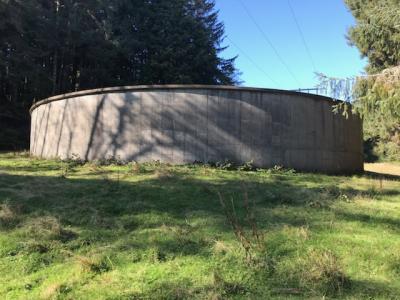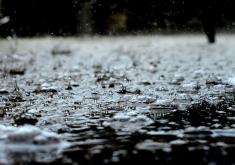
The mission of the Water division is to produce and distribute drinking water that complies with all state and federal environmental and health standards. The division is responsible for the operation and maintenance of the City’s water system which includes three underground springs, a water filtration plant, two booster pump stations, distribution piping system, and three water reservoirs with a combined volume of 2.63 million gallons, and all metered services.
The City's main source of water is derived from three unnamed springs located about 6,500 feet east of the City between the north and west forks of Elk Creek. The capacity of the springs is influenced by seasonal rainfall and runoff quantities. The City uses surface water from the West Fork of Ecola Creek as a secondary water source. The raw water intake is located about ½ mile upstream from the City’s sand filter water treatment plant. Historically, the City has utilized the creek to augment the low spring yield during the summertime peak demand season (July, August, and September).
The City operates two main storage reservoirs within the City’s single pressure zone; both reservoirs combined are operated to provide for equalization during peak hour demands, fire suppression, and supply during emergency situations. The main storage reservoir is located east of US Highway 101. The tank is supplied directly from the springs and the slow sand filter plant. During normal operation, water from the springs or filter plant is routed through the tank prior to entering the distribution system. The reservoir was constructed in 1974, has a storage volume of 1 MG, is constructed of concrete, and is in good condition. The City constructed the Tolovana steel reservoir on the southern end of town in 1986, providing an additional 1.6 MG of storage. The tank is filled via gravity from the Main reservoir. The City also has an additional 30,000-gallon reservoir that is used mainly for pressure stabilization and fire flow. The combined volume of the three reservoirs is 2.63 MG.
There are two water pump stations (Ash Street and Sunset) that supply water to local neighborhoods. Listed below are some of the division’s highlights:
- Control Valve Maintenance
- Dead End Flushing
- Fire Hydrant Maintenance and Testing
- Air Relief Valve Maintenance
- Pump Station Maintenance
- Slow Sand Filtration Plant Maintenance
- Annual Water Quality Reports
- Water Quality Testing and Tracking
- Check Valve Program
- Meter Replacement
- New installation, service requests, locates
Spring water quality is far superior to water withdrawn from surface sources such as rivers and lakes. Therefore, when river water is used for human consumption, no matter how pristine the appearance, we are required to treat the water. The City of Cannon Beach’s slow sand water filtration plant went on-line in June 1995. It utilizes one of the oldest, yet proven and reliable, technologies. Removal of harmful bacteria and viruses is accomplished without the use of any chemicals by filtering the water through our sand filters. The filtering process is both biological and physical. No chemicals are needed to enhance the performance of the filters. After filtration, a trace of chlorine disinfectant (0.3 parts per million) is applied to inactivate harmful organisms that, however unlikely, may have survived the filtration process. Addition and retention of a chlorine residual is required by law and is also necessary to prevent bio-films from forming in distribution piping and inadvertent contamination from water main leaks and repairs. The legal limits of chlorination range from a minimum of 0.2 to a maximum of 4.0 parts per million. The City does not add fluoride to the water.
Water quality is monitored by systematic and random sampling and testing. The City of Cannon Beach tests for 117 noxious contaminants: the number and kind required by the United States Environmental Protection Agency (EPA). The testing is conducted by an independent and state certified laboratory. Testing includes measurements of biological, chemical, and radiological contaminant levels. Most tests are analyzed for trace levels in the parts per billion range (sometimes parts per trillion). Water quality is of primary importance to the City of Cannon Beach and it is diligently guarded by trained and certified drinking water professionals.
